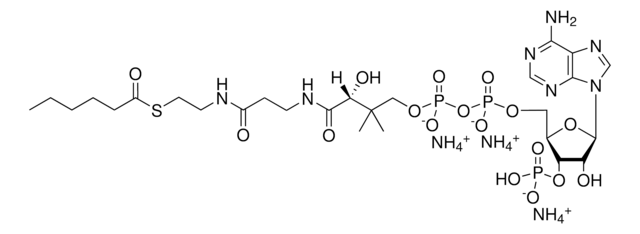870717P
Avanti
17:0 Coenzyme A
Avanti Research™ - A Croda Brand 870717P, powder
Synonym(s):
heptadecanoyl Coenzyme A (ammonium salt)
About This Item
Recommended Products
form
powder
packaging
pkg of 1 × 5 mg (870717P-5mg)
manufacturer/tradename
Avanti Research™ - A Croda Brand 870717P
application(s)
lipidomics
lipid type
coenzymes
shipped in
dry ice
storage temp.
−20°C
SMILES string
O[C@@](C(NCCC(NCCSC(CCCCCCCCCCCCCCCC)=O)=O)=O)(C(C)(COP([O-])(OP([O-])(OC[C@H]([C@H]1OP([O-])(O)=O)O[C@H]([C@@H]1O)N2C3=C(C(N)=NC=N3)N=C2)=O)=O)C)[H].[NH4+].[NH4+].[NH4+]
InChI
1S/C38H68N7O17P3S/c1-4-5-6-7-8-9-10-11-12-13-14-15-16-17-18-29(47)66-22-21-40-28(46)19-20-41-36(50)33(49)38(2,3)24-59-65(56,57)62-64(54,55)58-23-27-32(61-63(51,52)53)31(48)37(60-27)45-26-44-30-34(39)42-25-43-35(30)45/h25-27,31-33,37,48-49H,4-24H2,1-3H3,(H,40,46)(H,41,50)(H,54,55)(H,56,57)(H2,39,42,43)(H2,51,52,53)/t27-,31-,32-,33+,37-/m1/s1
InChI key
DRABUZIHHACUPI-DUPKZGIXSA-N
1 of 4
This Item | 870737P | 870706P | 870739P |
|---|---|---|---|
| packaging pkg of 1 × 5 mg (870717P-5mg) | packaging pkg of 1 × 5 mg (870737P-5mg) | packaging pkg of 1 × 5 mg (870706P-5mg) | packaging pkg of 1 × 5 mg (870739P-5mg) |
| storage temp. −20°C | storage temp. −20°C | storage temp. −20°C | storage temp. −20°C |
| manufacturer/tradename Avanti Research™ - A Croda Brand 870717P | manufacturer/tradename Avanti Research™ - A Croda Brand 870737P | manufacturer/tradename Avanti Research™ - A Croda Brand 870706P | manufacturer/tradename Avanti Research™ - A Croda Brand 870739P |
| shipped in dry ice | shipped in dry ice | shipped in dry ice | shipped in dry ice |
| application(s) lipidomics | application(s) lipidomics | application(s) lipidomics | application(s) lipidomics |
Application
Packaging
Legal Information
Storage Class Code
11 - Combustible Solids
WGK
WGK 3
Flash Point(F)
Not applicable
Flash Point(C)
Not applicable
Certificates of Analysis (COA)
Search for Certificates of Analysis (COA) by entering the products Lot/Batch Number. Lot and Batch Numbers can be found on a product’s label following the words ‘Lot’ or ‘Batch’.
Already Own This Product?
Find documentation for the products that you have recently purchased in the Document Library.
Our team of scientists has experience in all areas of research including Life Science, Material Science, Chemical Synthesis, Chromatography, Analytical and many others.
Contact Technical Service











